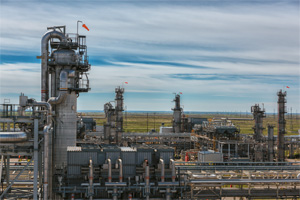Oilfield Service
Karachaganak: the local content and development of the West Kazakhstan region among main priorities

The Karachaganak gas condensate field discovered more than 40 years ago is truly unique. Today Karachaganak is a world-class project with multibillion-dollar investments, record production levels, and innovative technologies. Since the signing of the Final Production Sharing Agreement (FPSA) in 1997, KPO shareholders' investment in the development of the field has exceeded $27 bln.
Last year was very difficult on a global scale. The COVID-19 pandemic had a massive impact on the economy of all countries. Kazakhstan was no exception. In addition, a sharp decline of more than 30% in global demand for hydrocarbons has had a substantial impact on the energy sector. KPO, despite all the challenges and restrictions imposed due to COVID-19, continued to support local contractors to ensure business sustainability and social stability in the region.
At the same time, 2020 will be remembered as the year when more than 15 all-time production records were achieved. Also, significant progress was achieved in implementing two Plateau Expansion Projects namely Karachaganak Gas Debottlenecking (KGDBN) and Forth Injection Compressor.
The Karachaganak Gas Debottlenecking (KGDBN) Project which successful completion was announced by KPO in the spring of this year, represents a historic milestone in the continued development of the field. It improved industry benchmarks helping maintain high standards of safety and cost-efficiency.
The KGDBN Project is enabler for other Karachaganak expansion projects including the Forth Injection Compressor (4IC) Project, which is under execution stage. These projects will bring significant economic effect, continued revenue generation for the Republic of Kazakhstan and the Karachaganak partners while providing resources for further field investment projects and contribute to increase in local content.
As part of the implementation of expansion projects, KPO develops cooperation, first of all, with Kazakhstani companies, which brings positive results in their development and formation. Thanks to the collaboration with KPO, these companies were able to increase production volumes, transfer new technologies, and find partners to create consortia or joint ventures. Having risen to a new industrial development stage, local companies have become sought-after contractors for all major oil and gas projects in Kazakhstan and are expanding the scope of their activities.
An example is a contract for implementing the Forth Injection Compressor (4IC) Project at Unit-2. One of the project's objectives was to attract the necessary number of qualified specialists and ensure the participation of the maximum number of local welders. Since the beginning of the project, to develop safe work performance, increase efficiency and productivity, the consortium has started training local specialists.
The consortium prepared operators and welders of manual welding among local candidates. Currently, all of them are involved in the project. Most of them live in the West Kazakhstan region.
Today, KPO assists local manufacturers in finding foreign partners to establish joint ventures and consortia. Not only does it create opportunities for creating new jobs but it also contributes to the transfer of technologies and the development of new manufacturing capabilities in Kazakhstan, and supports local companies in their efforts to comply with international quality standards. This will enable us to expand the market share for domestically produced products on the global markets in the future.
In December 2020, the shareholders of the Karachaganak Project signed the Sanctioning Agreement in relation to the Karachaganak Expansion Project-1A (KEP1A Project) which is a large-scale event and one of the key milestones in the field development. The project, which includes construction of the Fifth Injection Compressor and other related facilities, is aimed at extending the liquids plateau extension, which, in turn, will help to generate additional revenue for the Republic of Kazakhstan and its partners in Karachaganak.
Currently, the KEP1A Project is at the stage of awarding engineering, procurement, and construction contract under the following conditions:
- at least 40% of the work must be performed by the Kazakhstani partner of the joint venture;
- execution of the volumes of goods, works, and services included in the list of the mandatory package is carried out only by Kazakhstani companies;
- achieving a local content share of at least 40% of the contract value.

Over the past few years, KPO has steadily increased local content in the company routine activities and all ongoing projects. This strategy applies to all areas and activities. As a result, local content performance improved from 47% in 2014 to 59% in 2020 in KPO contracts for the supply of goods, works, and services. It is also worth noting the stable growth of local content in goods from 1.35% in 2014 to 16% in 2020.
One of the main priorities for KPO, as an influential economic entity in the region, is to maximize the involvement of companies of the West Kazakhstan region in the development of the field. In 2020, KPO paid $319 million for the supply of goods, works, and services to the companies operating in the region with local content share amounting to $226 million, or 71%. Overall, KPO local content share in procurement of goods, works, and services since the signing of the Production Sharing Agreement has exceeded eight bln U.S. dollars.
At the same time, over the past few years, the structure of procurement of Kazakhstani goods has changed dramatically from simple products to complex and high-tech types of materials and equipment. If earlier, mainly, widely accessible goods were purchased, such as diesel fuel, gasoline, natural gas, now, under long-term contracts, KPO buys sophisticated technological products from domestic suppliers (thick-walled separators, modular electrical substations, structural steel, transformers, heat exchangers, 16" drill bits, ball valves, drill pipes, chemicals). Namely, products not previously produced in Kazakhstan in the right quality for KPO.
KPO fully supports the initiatives of the Government of Kazakhstan and the local administration of the West Kazakhstan region aimed at attracting investment and switching to new technologies.
Under paragraph 8 of the Action Plan for the Development of Oil and Gas Engineering of the Republic of Kazakhstan for 2019-2025, approved by the Ministry of Industry and Infrastructure Development and the Ministry of Energy, the operators and the Government on November 30, 2020, signed an agreement of intent on the establishment of an International Center for the Development of Oil and Gas Engineering.
The center's purpose is to support the development of the production of domestic goods, mainly equipment and spare parts for the oil and gas industry. This will lead to the attraction of new large-scale investments, transfer of innovative technologies, new jobs for the citizens of Kazakhstan. The center will create growth opportunities for local manufacturers.
The KPO openness policy acts as growth motivation for regional companies allowing them to access information on current and future KPO needs for goods and services, including technical specifications of the equipment offered for procurement. Thanks to that, local businessmen have the opportunity to get acquainted with the company's requirements in advance and prepare for tenders on time.
Within the framework of the approved KPO Program for the Development of Local Content for 2020-2021, the company continued implementing and certifying domestic producers according to ASME and API standards. Two Kazakhstani companies were successfully certified according to the ASME standard with the assistance of KPO, and two more Kazakhstani companies are undergoing the ASME certification process. Also, last year, as part of the implementation of the KPO Program for the Development of Local Content, KPO held online seminars for 150 representatives of small and medium-sized businesses in the West Kazakhstan region on the development of key business competencies. In particular, those whose activities are not directly related to the oil and gas industry.
The program's target indicators, designed for two years, must be achieved by the end of this year. The significant and critical activity of KPO aimed at increasing local content in the Karachaganak project and the development of Kazakhstani companies' scope of competence will continue further.
Arman Kusainov



